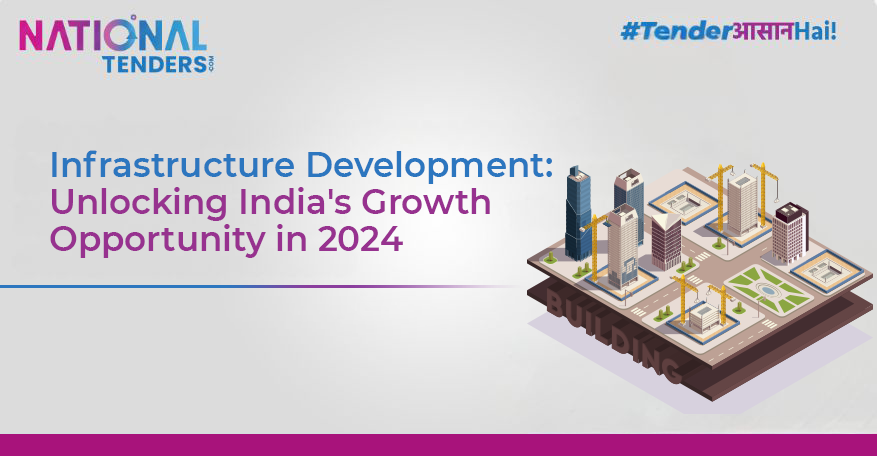- Home
- >
- Blog
OUR BLOG
A collection of stories about our people, our capabilities, our research, and the ever-changing face of our firm.

NationalTender
Infrastructure Development: Unlocking India's Growth Opportunity in 2024 | 12 May, 2024
Infrastructure Development: Unlocking India's Growth Opportunity in 2024
The outstanding rate of India's economic development is a
result of a constant emphasis on developing robust infrastructure. Although
global attention and investment are drawn to the booming Indian economy, still
strong infrastructure is a crucial component of this success.
The billions of dollars invested in initiatives such as
building new airports, modernizing roadways, and extending railways demonstrate
the government's devotion to this industry. In this blog post, we will explore
the growing infrastructure sector along with the opportunity it offers for
companies to develop and succeed.
The Impact of Infrastructure Development on India's Growth
A Catalyst for Economic Progress
Building roads and bridges is just one aspect of robust
infrastructure; another is setting the groundwork for a booming economy.
Imagine a buzzing industrial center with constant electricity, effective
transportation, and easy port access. For India, it is the future. With better
connectivity—from modernized airports to high-speed trains-India is emerging as
a major player in the world economy, drawing in foreign investment.
The impact of this infrastructure growth is far-reaching. Consider the following possibilities:
- Trade and Logistics: Faster movement of commodities is made possible by efficient transportation networks, such as improved ports and enlarged roads, which lowers costs and increases the competitiveness of Indian products in international markets.
- Manufacturing: India's reliable power grids and effective transportation networks attract companies wanting to capitalize on the nation's expanding market and highly qualified labor force.
- Job Creation: While infrastructure projects directly support employment in the construction and allied industries, they additionally promote development in other industries, which increases job prospects.
- Tourism: Better infrastructure and connectivity make India a more pleasant and approachable tourist destination, which strengthens the sector and generates employment for the local population.
- Urbanization: As infrastructure expands, it enables the development of new cities and towns, attracting people from rural areas and creating economic opportunities for all.
- Trade and Logistics: Faster movement of commodities is made possible by efficient transportation networks, such as improved ports and enlarged roads, which lowers costs and increases the competitiveness of Indian products in international markets.
- Manufacturing: India's reliable power grids and effective transportation networks attract companies wanting to capitalize on the nation's expanding market and highly qualified labor force.
- Job Creation: While infrastructure projects directly support employment in the construction and allied industries, they additionally promote development in other industries, which increases job prospects.
- Tourism: Better infrastructure and connectivity make India a more pleasant and approachable tourist destination, which strengthens the sector and generates employment for the local population.
- Urbanization: As infrastructure expands, it enables the development of new cities and towns, attracting people from rural areas and creating economic opportunities for all.
These are just a few examples of how infrastructure development can have a positive impact on India's economy and society. By investing in infrastructure, India can create a more prosperous and sustainable future for all its citizens.
Addressing Key Challenges
Though India's infrastructure
development is a success story, it is also a work in progress, constantly
evolving and adapting to the nation's growing needs. While challenges may
arise, they are being addressed as the country continues to move forward.
The Indian government is still consistently committed to
infrastructure development. Despite these challenges, the nation is moving on,
committed to creating an effective and contemporary infrastructure network that
will support its economic development for many years to come.
Opportunities for Businesses in the Infrastructure Sector
The Booming Industry
India's infrastructure industry is bustling with activity,
fueled by a perfect storm of government initiatives, increasing private sector
investment opportunities, and a rapidly expanding need for infrastructure
development. The ambitious motive of the government to upgrade electricity
systems, invest in renewable energy, and modernize transportation has opened up
several prospects for companies in the sector.
Key sub-sectors are experiencing rapid growth:
- Roads: The ambitious "Bharatmala Pariyojana" of the government intends to construct more than 85,000 km of roads, which would generate tremendous demand for construction businesses and other services. This massive project is paving the way for a golden opportunity - get ready to roll with 10,000+ Road Construction tenders.
- Broadways: Opportunities for engineering companies, rolling stock manufacturers, and technology suppliers flourish as India upgrades its railway network with high-speed rail lines, bullet trains, and remodeling of the current infrastructure. This is a golden opportunity to get on board with this exciting journey by exploring the numerous railway tenders online.
- Airports: While everyone's focused on ground infrastructure, India's skies are quietly booming. Airport construction and aircraft tenders are underrated category, playing a vital role in connecting people and infrastructure development.
- Power: The nation is rapidly investing in wind and solar energy, which is opening doors for manufacturers, installers, and technology suppliers.
The sheer scale of projects underway is evident in the numbers:
- The government has allocated over $1.4 trillion for infrastructure development over the next five years.
- Private sector participation is expected to rise significantly, with companies investing in projects across various sub-sectors.
- The demand for infrastructure is expected to continue growing as India's economic growth expands and the population increases.
Getting Started in the Infrastructure Sector
There are many ways for companies hoping to break into this expanding sector.
- Construction: Building everything from roads and bridges to airports and power plants, construction companies are at the forefront of infrastructure development.
- Engineering: Infrastructure projects need the technical know-how and construction quality that engineering companies provide in their design and supervision.·
- Consulting: Consulting companies provide infrastructure projects project management experience, feasibility studies, and strategic guidance.
- Material Supply: The infrastructure industry depends heavily on businesses that offer building supplies such as steel, cement, and aggregates.
- Technology: Through their solutions for smart cities, traffic control, and renewable energy, technology firms are becoming more and more significant in the development of infrastructure.
In this industry, several profitable businesses are
flourishing: Reliance Infrastructure (power production and transmission), Tata
Projects (infrastructure development), and Larsen & Toubro (construction
and engineering). These businesses are at the forefront of innovation and are
constantly contributing to the infrastructure development journey.
Scaling Up Your Infrastructure Business
Expanding an infrastructure business from a small or medium-sized one to a big player calls for a calculated strategy and unwavering dedication. This is how to go along the development route:
- Specialized Knowledge: Concentrate on specific fields of infrastructure, including smart city solutions, renewable energy, or specialist construction methods. This helps you to develop a stellar reputation and draw in customers looking for specialized knowledge.
- Make use of Technology: To increase productivity, boost project management, and simplify processes, embrace technology. Putting money into digital technologies can boost your project management skills, save expenses, and increase contract gains.
- Collective Partnerships: Partnering with bigger businesses can give you access to wider markets, resources, and experience. Working together, you can reach more people and bid on bigger jobs.
- Government Contracts: Look for government contracts since they may provide excellent chances for expansion. Establishing solid contacts and being aware of the needs of government organizations are essential.
Resources for growing your infrastructure business include
industry gatherings, mentoring programs, and online courses. In the rapidly
expanding Indian infrastructure market, you can gear up your business for
long-term success by fusing strategic planning with a solid basis.
The Role of National Tenders in Infrastructure Development
Large infrastructure projects sometimes include competitive
national bidding, in which enterprises compete for government contracts or
commercial sector opportunities to carry out large-scale building, engineering,
or development work.
"National Tender
hai toh tender aasan hai" ~ This saying highlights the importance of
understanding the intricacies of the tender process. It's not just about
submitting a proposal it involves thoroughly researching the project
specifications, crafting an accurate proposal, and delivering it in on time.
Considering expertise, financial ability, and the proposed project plan, the
bidder with the highest score is selected.
Obtaining a tender can be a game-changer for infrastructure
companies. It creates a solid reputation, increases income, and gives access to
big projects, therefore opening the door for the industry's future expansion
and prosperity.
Conclusion
India's infrastructural development offers an incredibly attractive prospect. The industry offers strong development for companies and long-term economic success for the country with ambitious government objectives and booming private investment. The advantages are many and include everything from better commerce to more job creation.
Companies can join this dynamic industry and support India's
economic narrative by solving issues and welcoming innovation. For companies
looking to participate in India's promising future, the infrastructure industry
provides a lucrative route via building, engineering, or technological
solutions.
 How E-Tendering is Transforming the Tender System in India
How E-Tendering is Transforming the Tender System in India Building Strong Vendor Partnerships in the Tender Ecosystem
Building Strong Vendor Partnerships in the Tender Ecosystem Unlocking Big Savings Through Smart Tender Strategies
Unlocking Big Savings Through Smart Tender Strategies How Generative AI Is Disrupting Tendering in 2025
How Generative AI Is Disrupting Tendering in 2025 Blockchain and Smart Contracts: The Next Frontier in Public Procurement
Blockchain and Smart Contracts: The Next Frontier in Public Procurement
SUBSCRIBE NOW
Kindly fill up the form